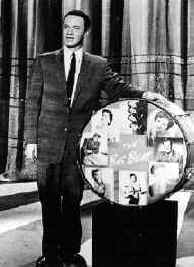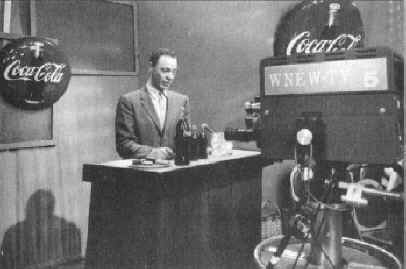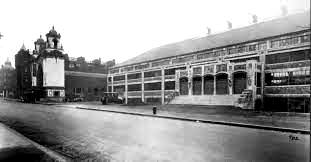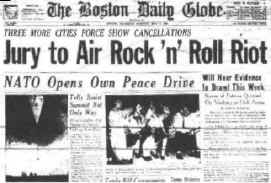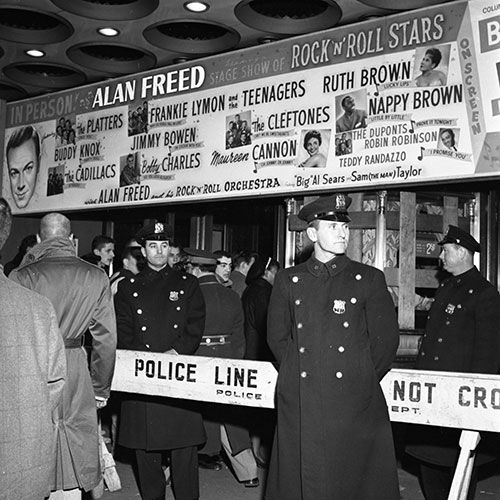Alan Freed
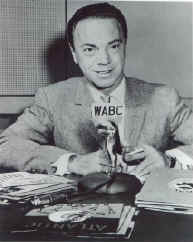
Photo courtesy Library of Congress
One of the most important popularizes of rock and roll during the
'50s, Alan Freed was the first disc jockey and concert producer
of rock and roll. Often credited with coining the term rock and
roll in 1951, ostensibly to avoid the stigma attached to R&B
and so called race music, Freed opened the door to white
acceptance of black music, eschewing white cover versions in
favor of the R&B originals.

Senior year at Salem (Ohio) High -
1939-1940
|
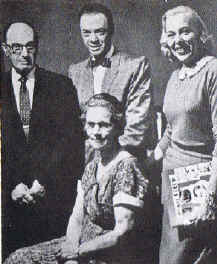
Freed family -Labor Day 1956
R to L: father Charles, Alan, sister Jackie
Seated: mother Maude
|
Albert James Freed was born December 15, 1922 in Johnstown,
Pennsylvania of a Welsh mother and Lithuanian born father. He
was one of three sons of Maude and Charles Freed, a clothing
store salesman. In 1933 when Freed was twelve his family moved to
Salem, Ohio. He attended Salem High School during which time he
formed a band known as the Sultans of Swing, in which he played
trombone. His ambition was to one day to become a bandleader, but
an ear infection ended that possibility. After he graduated from
high school in 1940, he enrolled at Ohio State University where
he studied engineering for a year. It was during this time
that he developed an interest in radio
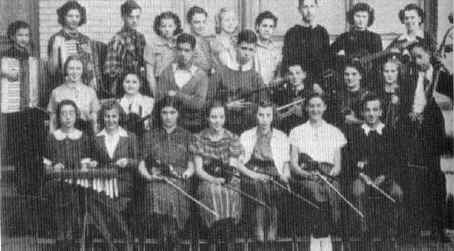
Photo Pictures from the Salem High School yearbook The
Quaker
courtesy Nick Talevski
|
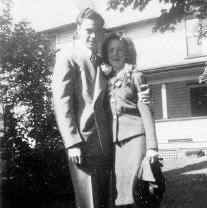
Alan and Betty Lou Bean
Photo courtesy Alana Freed
|
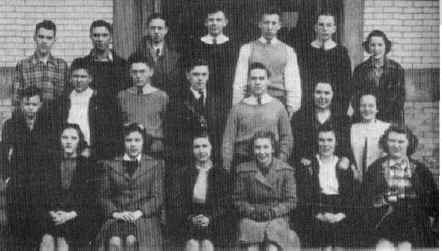
Photo Pictures from the Salem High School yearbook The
Quaker
courtesy Nick Talevski
|
After the Japanese bombed Pearl Harbor, Freed joined the US
Army where he was assigned to the Ski Patrol. It was at this time
he developed a serious ear infection causing him to receive his
discharge.He then enrolled at Ohio State University where he
earned a master's degree. Returning to Salem he went work as
a government inspector in military plants. It was here he met his
first wife Betty Lou Bean. They were married in 1942.
While at his government job, Freed enrolled in a night
broadcasting class in Youngstown, Ohio. After finishing he landed
a jobs at number of small stations. His first at WKST
(1942) in New Castle, Pennsylvania where he played classical
music for $45 a week. Next was sportscasting at WKBN (1942) and
WAKR (1945) where he became a local favorite, playing hot jazz
and pop recordings. Both of these stations were in Akron,
Ohio. In 1949 Freed landed a job and moved to WXEL-TV in
Cleveland.
In 1950, Freed went to the management of WAKR requesting more
money. When he didn't get it he quit went to another Akron
station WADC. Except Freed still was under contract to WAKR. A
law resulted that banned him from broadcasting within 75
miles of Akron for one year suit. He then left Akron for
Cleveland.
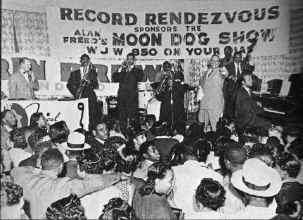
It was at this time that Freed took his Request Review to
WXEL-TV where the show bombed. However he stayed hosting a midday
movie before he went to WJW where he did a classical radio show
and late night movie on their television station.
One night he was asked to fill in for a sick colleague and
instead of but didn't stick to the station's playlist the
selection of records was suppose to play. Instead he played the
rhythm and blues records of Chess, Modern, King and Atlantic
Records. The next day he was fired. however, the station was
bombarded with mail from listeners and Freed was rehired.
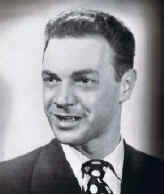
WAKR - 1949-1950
Courtesy John Cavello, National Television Archive
|

Leo Mintz
|
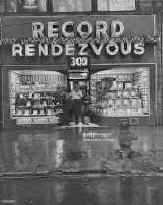
Record Rendezvous Store
|
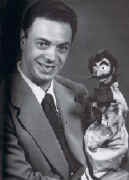
WXEL - 1950-1951
Courtesy John Cavello, National Television Archive
|
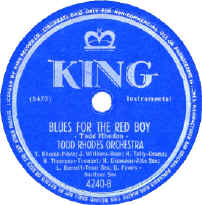
Leo Mintz who owned the Record Rendezvous a local
record store saw an increasing number of white teenagers buying
rhythm and blues records at his store. Based on these
observations Mintz suggested to Freed he would sponsor his show
if he would begin playing these records. On July 11, 1951, at 11
PM signed off on his classical program. Putting the needle down
on Todd Rhodes's Blues For A Moondog calling himself
"Moondog," Freed went on the air with his Moondog Rock
and roll Party and became among the first to program rhythm and
blues for a white teenage audience. Within eighteen months it was
the number one radio show in Cleveland. Other small stations
followed eventually forcing the larger stations to join in.
Due to the prejudices of the times Freed began calling the
rhythm and blues records he played Rock "n" Roll. What
is ironic that term Freed was using to make rhythm and
blues more acceptable to a white audience, was slang for sex in
the black community.
In 1951 a black vocal group The Dominoes recorded "Sixty
Minute Man" which was a (#1 R&B and #17 pop) hit. The
lyrics were highly suggestive and used rock and roll in the
lyrics. Freed began using the term a month later and most likely
was inspired by this song.
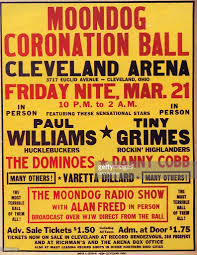
|
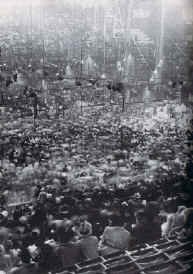
Moondog Coronation Ball - 3/21/52
Courtesy John Cavello, National Television Archive
|
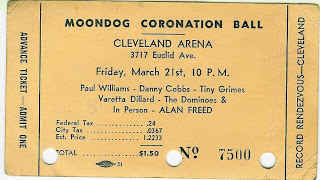 |
Freed would name his show Moondog's Rock 'n' Roll Party. The
shows success led to Freed's March 1952 Moondog Coronation
Ball in Cleveland. Top black acts were booked for the show. Six
thousand fans crashed gates in addition to the thousands already
in 10,000 seat hall. Two thirds of the audience was white
Freed started his own record label Champagne Records and the
first act signed were the Crazy Sounds. Later he would
changed their name to the Moonglows. Freed's brother David
had a small company called Lance Distribution, which specialized
mostly R&B, handled the distribution end for Champagne.
In the early hours of a night in April 1953, while
driving home from work, Freed fell asleep at the wheel and
crashed into a tree. The crash was heard at a near by police
statuin and when the police went to investigate they found Freed
unconscious in the wreckage. when his heart stopped beating and
injection of adrenaline was injected. Freed was seriously
injured, with a punctured lung and damage to his spleen and
liver. Skin on his face was peeled away to which doctors had to
replace it and sew it back across his forehead. It took 260
stitches and extensive plastic surgery to get Freed's face
somewhat back to normal. The doctors would later tell him he was
lucky to have survived.
Freed laid for weeks critically ill fighting for his
life in the hospital. Once off the critical list doctors to Freed
that considering the extent and severity of his injuries, not to
expect to live more than another ten years and he could never
have another drink. Freed would outlive the ten year prediction
but not by much. Freed would not give up drinking.
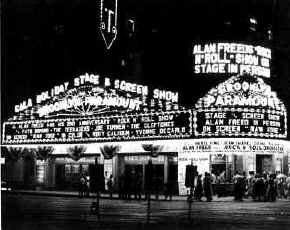
|
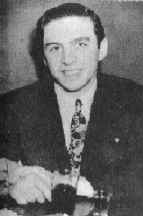
Morris Levy
|
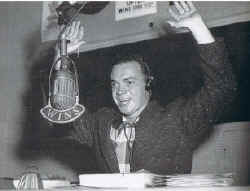
WINS-1955
Courtesy John Cavello, National Television Archive
|
In 1954 with Morris Levy as his manager, Freed moved his show
to WINS radio in NY. Within months the show was #1. Freed began
staging revues at Brooklyn Paramount where he often could be
found on stage gyrating. Freed appeared in a number of rock
and roll movies such as Don't Knock The Rock,
Rock Around The Clock, and Rock, Rock, Rock.
It was no surprise that these movies broadened the acceptance of
rock and roll. The real surprise was Alan Freed in the flesh. In
his mid-thirties Freed looked at least ten years older. Klutzy
with little stage presence Freed looked completely out of
place. To many teens Freed looked like the ultimate adult.
Thomas Louis Hardin
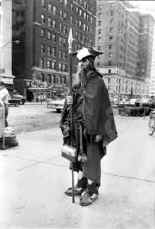
"He looked like Christ in Christ-like clothes"
Morris Levy
Upon Freed's move to New York, there was a controversy over
his famous trademark, Moondog. It concerned a street musician by
the name of Thomas Louis Hardin who had adopted the name
Moondog. Hardin, a blind eccentric street musician, who dressed
as a Viking, sold umbrellas from a stand at the corner of 54th
Street and Sixth Avenue. Hardin didn't take kindly to
Freed's using his "monicker" and filed a law suit for
$100,000 and asking the New York Supreme Court to issue a cease
and desist order. The facts he presented were he had been
using the name Moondog since 1947, whereas Freed didn't take it
until 1951 with the clincher that Freed did not begin calling
himself "Moondog" had begun playing "Moondog
Symphony" on his Cleveland radio show. The composer of that
song was none other than Thomas Louis "Moondog" Hardin.
Case closed.The judge ruled in favor of Hardin, ordered Freed to
pay him $5,700 in damages, and stop using the name.
Thereafter he called his show Alan Freed's Rock 'n' Roll
Party.
The show was so popular that in two years Freed's salary
went from from a base of $15,000 plus twenty-five percent from
his show's advertising monies to a yearly income in excess
of $750,000. By 1955, Freed was appearing in a number of rock and
roll films that cost a couple hundred dollars to make and grossed
millions.
Freed's
Big Beat aired in New York City, first on WABC-TV; then,
in 1959, on WNEW
|
A
Sample Hour of Alan Freed Rock 'n' Roll Party
In 1957 ABC-TV gave Freed his own nationally-televised rock
& roll show, but an episode on which Frankie Lymon danced
with a white girl enraged thirteen ABC's Southern affiliates and
the show was cancelled.
Freed's beginning of the end began when he put on
a show at the Boston Arena (1958).
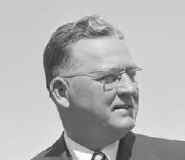
"These so called programs are a disgrace and must be
stopped. As far as I'm concerned Boston has seen the last of
them"
Boston Mayor John B. Hynes
In Boston that Saturday night in
May, 20 police were on hand for the 5,000 rock ‘n roll fans
who jammed into the Arena.
The first half of the show went
smoothly. But during the second half, police interrupted the show
several times, forcing Freed to quiet the audience. Jerry Lee
Lewis and his bands had the kids dancing in the aisles, but the
police again forced Freed to stop the show and make the audience
sit down.
Then Chuck Berry came on stage
to close the show. Again, the kids danced in the aisles. Again,
the police forced Freed to make them sit down. One of the police
officers refused to dim the houselights. Freed, frustrated, told
the audience, "It looks like the police in Boston don’t
want you kids to have any fun."
At that point, fighting broke
out and kids started throwing chairs at each other. Freed got
blamed for inciting the melee with his remarks, but the fight may
have been a result of gang rivalry. Berry hid behind the drummer
to get as far away from the scuffle as possible. The crowd then
poured out into the streets.
What happened next is unclear.
The newspapers reported stabbings, sluggings, robberies and
rapes. Jack Hooke, Berry’s manager, remembers walking out of
the Arena a half hour after the show ended and seeing nobody.
The neighborhood surrounding the
Arena was then a rough part of town with frequent muggings. A
lawyer for Alan Freed said the police simply took everything from
the police blotter in the precinct that night and blamed it on
his client.
Only two people were arrested,
and a news item about the riot described incidents far from the
Arena – rock throwing at the Boston Garden and muggings in
Roxbury and Back Bay.
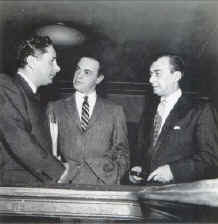
With lawyers, Suffolk County Court, May 16, 1958
(L-R) Paul Smith, Alan Freed, Warren Troab
A few days after the concert, a
Suffolk County grand jury indicted Alan Freed for inciting a
riot. Suffolk County District Attorney Gabriel Byrne justified
the indictments. He said the ‘attitudes of the adults
sponsoring the shows’ inspired the ‘juvenile
outbreaks.’
Though the charges were later dismissed for lack of evidence,
but WINS failed to renew Freed's contract. This incident forced
him into into bankruptcy and would just be the beginning of
Freed's legal problems.
On Thursday, Alan Freed
announced he was quitting WINS because the station didn’t
stand behind him.
This action took
Freed by surprise since his contract with the station gave
it 25% of whatever his stage shows earned. In fact Freed
who considerd himself a "goodwill ambassador" for
the station was counting on the station paying for his defense.
ABC-TV affidavit
Below is the ABC affidavit /questionaire that
on November 13, 1959 that was sent to every individual that who
participated in the selection over ABC's facilities
Do you now receive or have you received payment
or credit for anything of value directly or in directly such as
through a relative or business entity in which you or a relation
has or had a financial interest for the broadcasting of any
music, musical composition or any recording?
Have you ever refused to accept or failed to
accept for broadcasting any music, musical composition or musical
recording unless payment of or credit for anything of value
directly or indirectly was made to you or for you?
Do you have, or any relative of yours have
ownership of, or beneficent in a musical copyright or performance
right, or in any music publishing, recording, pressing or
merchandising?
If any of the three question were answered yes,
they were to be "explained in detail." The questionaire
was to then be signed, notarized and returned to ABC's legal
department.
Freed moved to WABC radio, and also hosted a
locally televised dance show. ABC asked Freed to sign an
affadavit that he never received and money or gifts to
promote records. Freed refused and was fired.
In 1959 the U.S. House Oversight Committee, at the urging of
ASCAP, began to look into deejays who took gifts from record
companies in return for playing their records on their shows.
Though a number of deejays and program directors were caught in
the scandal, the committee decide to focus on Freed.
Freed's broadcasts alliances quickly deserted him. In 1959, WABC
in New York asked him to sign a statement confirming that he had
never accepted payola. Freed refused "on principle" to
sign and was fired.
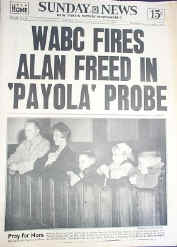
Within the industry there was widespread belief
that Freed was set- up and the hearings were prompted by ASCAP,
who represented the songwriters and publishers of pop music, much
which Freed refused to play.
. "I never take a dime to plug a
record. I'd be a fool to do so; I'd be giving up control of my
program."
Alan Freed
Unable to impose any formal punishment on Freed
it wrote a bill that made giving or receiving of payola a federal
crime, punishable by up to two years in jail.
On Feb 8, 1960 a New York Grand Jury began looking into
commercial bribery information in the recording industry and on
May 19, 1960 eight men were charged with receiving $116,580
in illegal gratuities. This probe would lead to Freed being
charged with income tax evasion by the IRS.

(Left to right) Mel Leeds, program director WINS, Peter Tripp,
WMGM disc jockey Alan Freed being booked at a New York police
station in May 19, 1960. Man on the end is detective Michael
Canning.
The two most prominent disc jockeys brought
before the Committee were Alan Freed and Dick Clark The treatment
each received was quite different
Freed wasn't the only deejay subpoenaed by the Oversight
Committee and refused to testify despite being given
immunity. The trial began December, 1962 and ended with
Freed pleading guilty to two of the seven counts of
commercial bribery receiving a $300 fine and a six month
suspended sentence. He was also accused of accepting more than
$30,000 in bribes from seven record companies and pleaded guilty
to only accepting $2,000 from one and $700 from another.
Ironically, what ultimately sealed his fate were Freed’s
forthright itemized admissions to the committee concerning
payments he had accepted from distributors and recording
companies as a musical advisor. The fact that ABC had fired him
for declining to sign a humiliating all-encompassing oath denying
participation in corrupt practices, while not asking the same of
the company’s other contract employee, Dick Clark, only
deepened committee members’ and the press’ perception
of Freed’s corruption. Less than a month after his
testimony, the New York City police arrested the disgraced DJ on
charges of having pocketed payola amounting to $116,850.
In January 1963, he was arrested on a warrant charged that he
hadn't paid the fine imposed six months earlier. Though he only
received a $300 fine and 6 months suspended sentence his career
would be over.
Bankrupt, despondent, and frequently drunk, Freed relocated to
Palm Springs.
Forced to leave New York Freed work briefly at KDAY (owned by
the same company that owned WINS) in 1960, in Los Angeles, but
when management refused to let him promote live rock & roll
shows Freed left the station and returned to Manhattan to emcee a
live Twist revue. When the twist craze cooled he hooked on
as a disc jockey at WQAM (Miami, FL). Realizing that his dream of
returning to New York radio was just that, Freed's drinking
increased. The Miami job lasted only two months.
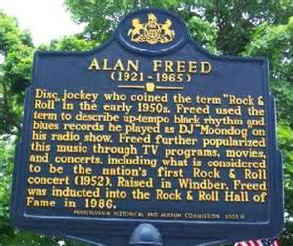
Marker in Wilber, PA where Freed was raised
|
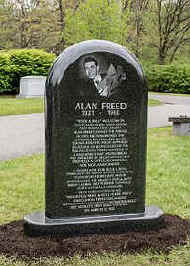
Marker at Lakeview Cemetery
|
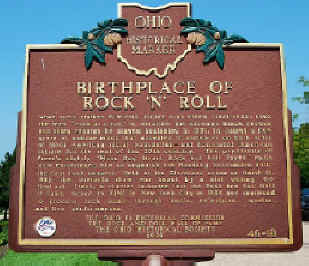
Cleveland Historical Marker
|
Freed spent his last days alone, calling friends in the music
business asking money for rent and grocery bills.
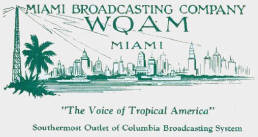
photo courtesy
alanfreed.com
March 15, 1964 Freed was indicted by a federal grand jury for
tax evasion. The IRS claimed that Freed owed $37,920 tax on
unreported of $56,652 for the years 1957-59. Living in Palm
Springs, California at the time, Freed was poor, unemployed and
unemployable. Before he could answer the charges he entered a
hospital suffering from uremia a condition caused by the
retention in the of body poisons normally expelled in urine. Alan
Freed died Jan 20, 1965 of cirrhosis, a penniless, broken man. He
was 43.
Freed truly loved rock and roll, claimed to have
never have played a record he didn't like and never forgot where
the music came from. However, he was a flawed man who claimed
songwriting credits that weren't his, paid performers on his
tours very little and associated with questionable individuals.
Alan Freed was inducted in to the Rock and
Roll Hall of Fame in 1986.
Alan Freed
Alan
Freed Chronologial History In Newsprint
Alan
Freed on WINS 1010 AM Radio




















